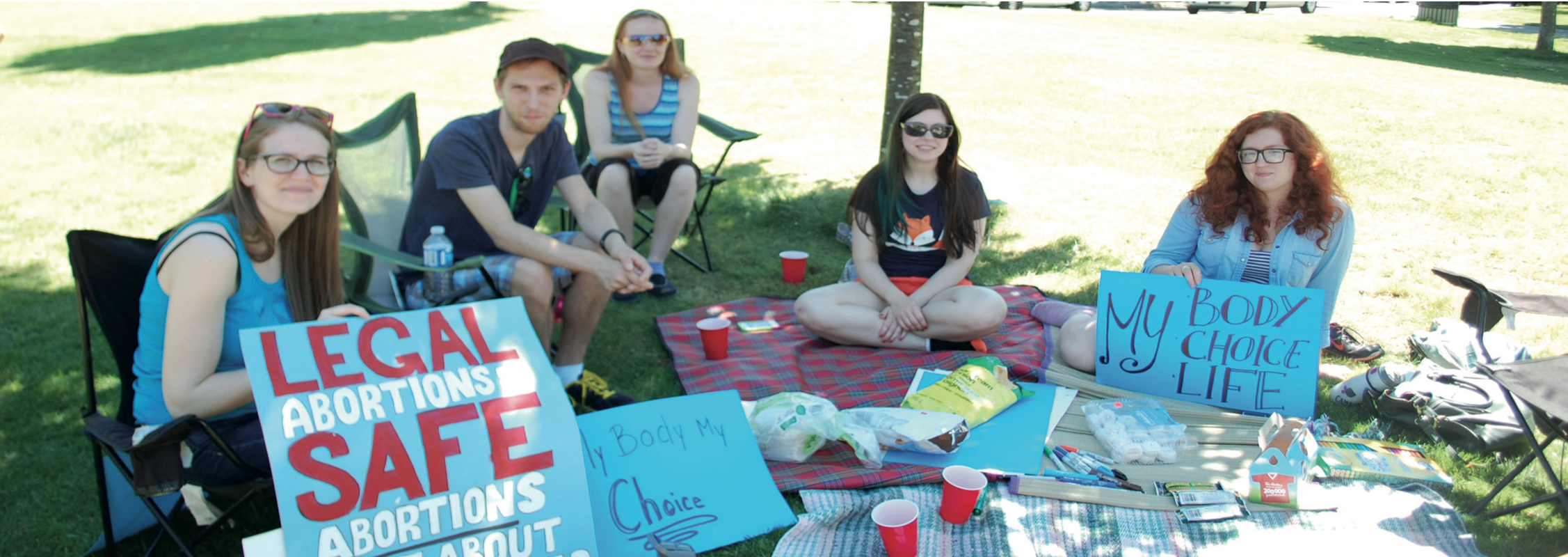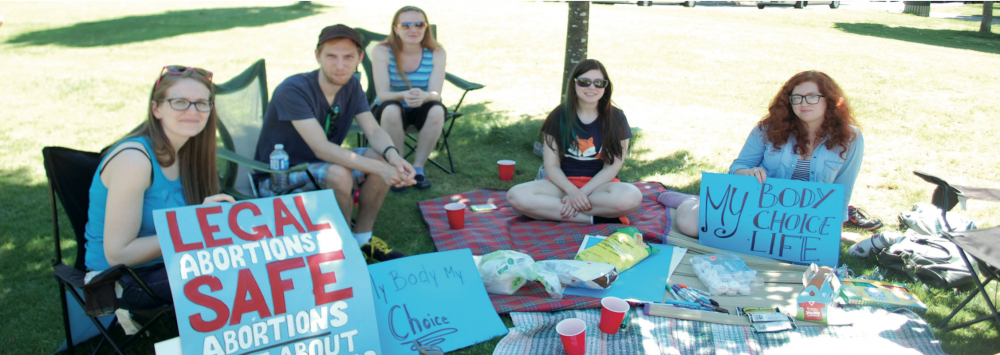Divides in the Fraser Valley community over the subject of abortion continue to show up in public events. The latest convergence of arguments happened at the 27th annual Walk for Life, held at Mill Lake on Saturday, June 4.
The event, organized by Advokate, a pro-life organization, was designed to be a family-friendly one, featuring bouncy castles for children to play in while the walkers registered and set off around Mill Lake Park. However, concerned members of a recently formed pro-choice organization, Think Outside My Box, believed that the event was contributing to a slanted discussion around women’s reproductive rights.
Unlike the UFV Life Link display on the Abbotsford campus on March 21, which saw an immediate, unplanned response from individual students, the Walk for Life and its accompanying pro-choice protest were both planned out well in advance, with both sides having prepared information to represent their thoughts on the issue. The event also saw both sides maintain a courteous, non-confrontational disposition.
Despite this, by the end of the day some members of Think Outside My Box were the subjects of cutting comments by irate walkers.
“We did see a bit of aggression from an older gentleman and a young couple that came over to yell at us over the course of the afternoon,” said Avril Field, a UFV alumna and the founder of Think Outside My Box. “The couple was calling us evil and arguing without even letting us interject. They stood there for at least five minutes yelling at us. Because they didn’t want a respectful conversation, we asked them to leave us alone. We had not been engaging with anyone unless we were spoken to first. We had in no way instigated any sort of confrontation.”
Field formed the group alongside other UFV graduates and current students in response to a pro-life display on Sumas Way last winter. However, the Walk for Life was the group’s first organized public appearance. Gathered in the shade of a tree off to the side of Advokate’s space, with statistics and slogan-emblazoned signs around them, the group maintained a quiet, yet visible presence. According to Field, they deliberately decided to remain non-confrontational and had been in contact with Advokate’s general manager, Jared White, and coordinator of client services, Elizabeth Sutcliffe, about the differences between the two groups and their presence at the walk.
“There’s a lot we agree on,” Field said. “We both want to support women, but we just have very different ideas on how to do that.”
Sutcliffe, taking a break from helping at a registration table, had a similar point of view.
“We understand that everyone has a right to be heard, and they’ve been very respectful,” she said. “But we just don’t agree.”
The primary disagreement between the two organizations centres around resources: whether or not women are provided with sufficient options and enough information to make an informed choice when confronted with an unplanned pregnancy.
Field was critical of Advokate’s services in this area.
“They do describe abortion as a choice; however, they do so in a way that contributes to the stigma, the guilt and shaming of women who choose to have abortions,” she said.
Sutcliffe believes that it’s important to make people aware of the implications of that choice.
“I used to be PC [pro-choice] and I made the decision to abort, and I’ve regretted it ever since,” she said. “It affected me even more with my planned pregnancies — when I got pregnant with my children, I found out how developed the child I’d aborted had been. I felt sick, [and] it got worse as my pregnancy went along. I was diagnosed with PTSD … It’s not about making it legal; intrinsically my body knew what had happened to it wasn’t natural.”
That awareness doesn’t, in Field’s estimation, extend to all areas of education. Focusing specifically on the resources provided by Advokate, she said they are, simply put, inadequate.
“They won’t refer women who choose abortion to abortion services, or professional counselling afterwards, instead offering their own services,” she said. “Nor do they provide contraceptives or advocate for family planning. Their stance is that contraceptives lead to more unplanned pregnancies.”
Sutcliffe, however, states that in her opinion, the services provided by pro-choice organizations are just as, if not more, inadequate.
“I’d actually say they’re a little hypocritical,” she said. “I’ve spent years looking for a secular clinic that offers post-abortion services — if they truly care about the women, then why aren’t there services for them?”
To Field, the main focus of the discussion revolved around women’s rights.
“None of us are saying that life isn’t precious. It is, it absolutely is,” she said. “But this is about bodily autonomy, this is about women being forced to carry a child because of societal pressures, and lack of information.”
Sutcliffe argued those societal pressures exist on both sides.
“Your family, your friends, your boyfriend, everyone, all of society is telling you that unless you’re in the perfect situation, you shouldn’t bring a new life into this world,” she said. “They all shame you if you decide not to get an abortion. Our values start at conception.”
Based on both sides’ accounts, the realm of early-term decisions is where each would like to see a shift in how women are talked to, how their responses to this complex issue can dictate the future.
“We’re not pro-abortion … we just believe that people should be given all the choices, and one of those choices is abortion,” Field said. “It should be presented as a choice, and not in the way that they do it, which is a negative, guilty one that propagates the idea that women should be shamed. They don’t give women enough credit.”



